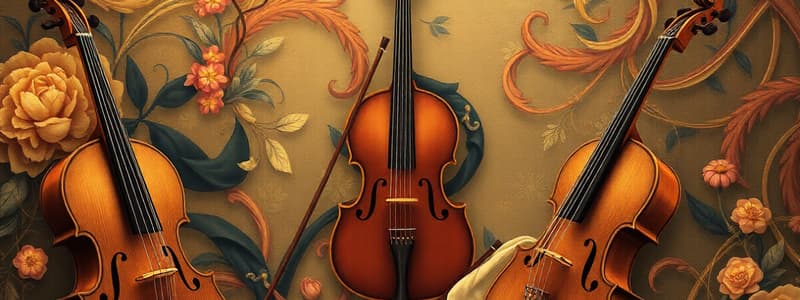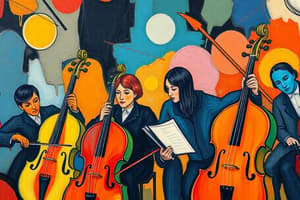Podcast
Questions and Answers
What are the two distinct styles of opera that were developed during the Classical Period?
What are the two distinct styles of opera that were developed during the Classical Period?
- Opera Seria and Opera Buffa (correct)
- Opera Buffa and Opera Comica
- Opera Seria and Opera Comica
- Opera Seria and Opera Recitative
What is the most important form that was developed during the Classical Era consisting of three distinct sections: Exposition, Development, and Recapitulation?
What is the most important form that was developed during the Classical Era consisting of three distinct sections: Exposition, Development, and Recapitulation?
- Concerto Allegro Form
- Rondo Allegro Form
- Symphony Allegro Form
- Sonata Allegro Form (correct)
What is the name of the musical period in which classical music was established?
What is the name of the musical period in which classical music was established?
Baroque
What is the name of the short musical composition designed to provide practice in a technical skill in the performance of a solo instrument?
What is the name of the short musical composition designed to provide practice in a technical skill in the performance of a solo instrument?
The Concerto is a multi-movement work designed primarily to emphasize the individuality of the solo instrument and to exhibit the virtuosity and interpretative abilities of the performer.
The Concerto is a multi-movement work designed primarily to emphasize the individuality of the solo instrument and to exhibit the virtuosity and interpretative abilities of the performer.
Which of the following is NOT a characteristic of classical music?
Which of the following is NOT a characteristic of classical music?
What musical instrument is associated with Franz Joseph Haydn's Symphony No. 94?
What musical instrument is associated with Franz Joseph Haydn's Symphony No. 94?
What composer was known for writing the operas 'The Marriage of Figaro', 'Don Giovanni', and 'The Magic Flute'?
What composer was known for writing the operas 'The Marriage of Figaro', 'Don Giovanni', and 'The Magic Flute'?
Which composer was known as a child prodigy and is considered the most amazing genius in musical history?
Which composer was known as a child prodigy and is considered the most amazing genius in musical history?
Which of the following composers is credited with bridging the gap between the Classical and Romantic periods?
Which of the following composers is credited with bridging the gap between the Classical and Romantic periods?
Beethoven's music generally veered toward larger orchestras and gave its music a darker mood.
Beethoven's music generally veered toward larger orchestras and gave its music a darker mood.
What is the term used to describe the short, self-contained fragment of a musical theme or subject, as defined by the Harvard Dictionary of Music ?
What is the term used to describe the short, self-contained fragment of a musical theme or subject, as defined by the Harvard Dictionary of Music ?
What is the term used to describe a multi-movement work for solo instrument?
What is the term used to describe a multi-movement work for solo instrument?
What is the name of the classical music piece that is traditionally written for the whole orchestra?
What is the name of the classical music piece that is traditionally written for the whole orchestra?
Classical music is primarily downloaded digitally today and hard copies are no longer common.
Classical music is primarily downloaded digitally today and hard copies are no longer common.
Classical music is no longer relevant in today's world and has fallen out of place in society.
Classical music is no longer relevant in today's world and has fallen out of place in society.
What Bach's Prelude and Fugue Number 20 in A Minor is often said to be ?
What Bach's Prelude and Fugue Number 20 in A Minor is often said to be ?
Mozart is credited with composing the first four-chord melody, which is now commonly found in pop and rock songs.
Mozart is credited with composing the first four-chord melody, which is now commonly found in pop and rock songs.
Flashcards
Classical Music Era
Classical Music Era
The period from 1750 to 1820, characterized by significant changes in musical forms and styles, influenced by aristocracy as patrons, and driven by cultural shifts in architecture, literature, and the arts.
Symphony
Symphony
A musical composition for orchestra, typically in four movements.
Concerto
Concerto
A musical work for a solo instrument accompanied by an orchestra.
Opera
Opera
Signup and view all the flashcards
Opera Seria
Opera Seria
Signup and view all the flashcards
Opera Buffa
Opera Buffa
Signup and view all the flashcards
Sonata
Sonata
Signup and view all the flashcards
Sonata Allegro Form
Sonata Allegro Form
Signup and view all the flashcards
Franz Joseph Haydn
Franz Joseph Haydn
Signup and view all the flashcards
Wolfgang Amadeus Mozart
Wolfgang Amadeus Mozart
Signup and view all the flashcards
Ludwig van Beethoven
Ludwig van Beethoven
Signup and view all the flashcards
Classical Music Characteristics
Classical Music Characteristics
Signup and view all the flashcards
Classical Orchestra
Classical Orchestra
Signup and view all the flashcards
Musical Motive
Musical Motive
Signup and view all the flashcards
Classical Music Today
Classical Music Today
Signup and view all the flashcards
Study Notes
Opera Styles in the Classical Period
- Opera seria focused on serious subjects, often based on Greek mythology or history.
- Opera buffa highlighted comedic situations and characters, often drawing on everyday life.
Sonata Form
- The most important form established during the Classical Era is sonata form
- Sonata form consists of three distinct sections:
- Exposition: Introduces the main themes of the piece.
- Development: Explores and transforms those themes.
- Recapitulation: Reiterates the themes from the exposition, often with variations or embellishments.
Period of Classical Music
- The Classical Period in music extended from roughly 1750 to 1820
- The Classical Period established classical music as a distinct style.
Etude
- The étude, a short musical composition designed to provide technical practice for solo instrument performance.
Concerto
- The Concerto is a multi-movement work designed to showcase the solo instrument's unique qualities
- The Concerto highlights the performer's virtuosity and interpretive skills.
- The Concerto features a dialogue between the solo instrument and the orchestra.
Characteristics of Classical Music
- Emphasis on clarity and balance were key elements of classical music.
- Classical music used homophony where a melody was supported by chords.
- Simplicity of structure, with a focus on pleasing melodies, was common.
- Often featured regular, predictable rhythms.
Symphony No. 94
- Franz Joseph Haydn's Symphony No. 94, often called the "Surprise Symphony", features a timpani drum.
Mozart's Operas
- Wolfgang Amadeus Mozart composed three famous operas:
- The Marriage of Figaro
- Don Giovanni
- The Magic Flute
Mozart's Genius
- Wolfgang Amadeus Mozart was a child prodigy, known for his exceptional musical talents.
- Mozart is considered one of the greatest musical geniuses in history.
Bridging the Gap
- Ludwig van Beethoven bridged the gap between the Classical and Romantic periods.
Beethoven's Music
- Beethoven often used larger orchestras in his compositions.
- Beethoven's music often had a darker, more dramatic mood than earlier Classical composers.
Musical Theme
- A motive is a short, self-contained fragment of a musical theme or subject.
Concerto
- A concerto is a multi-movement work for solo instrument.
Symphony
- The symphony is a piece of classical music traditionally written for a full orchestra.
Classical Music Today
- Classical music is widely accessible today through digital downloads.
- Classical music remains relevant and continues to be enjoyed by many people worldwide.
Bach's Preludes and Fugues
- Johann Sebastian Bach's Prelude and Fugue Number 20 in A Minor is considered a masterpiece of the Baroque era.
Mozart’s Musical Innovation
- While there is no concrete evidence, Mozart is often credited with the creation of the first four-chord melody.
Studying That Suits You
Use AI to generate personalized quizzes and flashcards to suit your learning preferences.




